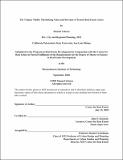| dc.contributor.advisor | John F. Kennedy. | en_US |
| dc.contributor.author | Velazco, Manuel,S.M.Massachusetts Institute of Technology. | en_US |
| dc.contributor.other | Massachusetts Institute of Technology. Center for Real Estate. Program in Real Estate Development. | en_US |
| dc.date.accessioned | 2021-01-06T17:39:15Z | |
| dc.date.available | 2021-01-06T17:39:15Z | |
| dc.date.copyright | 2020 | en_US |
| dc.date.issued | 2020 | en_US |
| dc.identifier.uri | https://hdl.handle.net/1721.1/129090 | |
| dc.description | Thesis: S.M. in Real Estate Development, Massachusetts Institute of Technology, Program in Real Estate Development in conjunction with the Center for Real Estate, September, 2020 | en_US |
| dc.description | Cataloged from student-submitted PDF of thesis. | en_US |
| dc.description | Includes bibliographical references (pages 58-59). | en_US |
| dc.description.abstract | We founded T-Space in response to the underutilization of transit stations and the opportunity it presents itself being a high volume, small footprint space with a strong network to residential neighborhoods and employment centers. As a team, we found ourselves asking: Can transit stations be an alternative space for retail service? Can we bring convenience to commuters? Can we add to the neighborhood identity through modernization and wayfinding strategies? Can we help transit agencies improve their real estate source of income? This thesis articulates the T-Space business model developed through MIT's DesignX accelerator program. T-Space, short for Transit Space, is a real estate company focused on modernizing stations and improving the quality of life for commuters. Our mission is to revitalize these untapped assets and incorporate innovative retail technology for convenience. By modernizing transit stations across the United States, we have an opportunity to better connect transit stations to its community while increasing the real estate revenue source for the transit agency. At the same time, retailers can test new markets, while commuters benefit from automation and self-service. In our efforts of developing a business model that works for transit agencies, retailers, and commuters, we hope the success of projects contribute to an increase in ridership. | en_US |
| dc.description.statementofresponsibility | by Manuel Velazco. | en_US |
| dc.format.extent | 60 pages | en_US |
| dc.language.iso | eng | en_US |
| dc.publisher | Massachusetts Institute of Technology | en_US |
| dc.rights | MIT theses may be protected by copyright. Please reuse MIT thesis content according to the MIT Libraries Permissions Policy, which is available through the URL provided. | en_US |
| dc.rights.uri | http://dspace.mit.edu/handle/1721.1/7582 | en_US |
| dc.subject | Center for Real Estate. Program in Real Estate Development. | en_US |
| dc.title | The T-Space Model : maximizing value and revenue of transit real estate assets | en_US |
| dc.title.alternative | Maximizing value and revenue of transit real estate assets | en_US |
| dc.type | Thesis | en_US |
| dc.description.degree | S.M. in Real Estate Development | en_US |
| dc.contributor.department | Massachusetts Institute of Technology. Center for Real Estate | en_US |
| dc.identifier.oclc | 1227097538 | en_US |
| dc.description.collection | S.M.inRealEstateDevelopment Massachusetts Institute of Technology, Program in Real Estate Development in conjunction with the Center for Real Estate | en_US |
| dspace.imported | 2021-01-06T17:39:13Z | en_US |
| mit.thesis.degree | Master | en_US |
| mit.thesis.department | RED | en_US |
